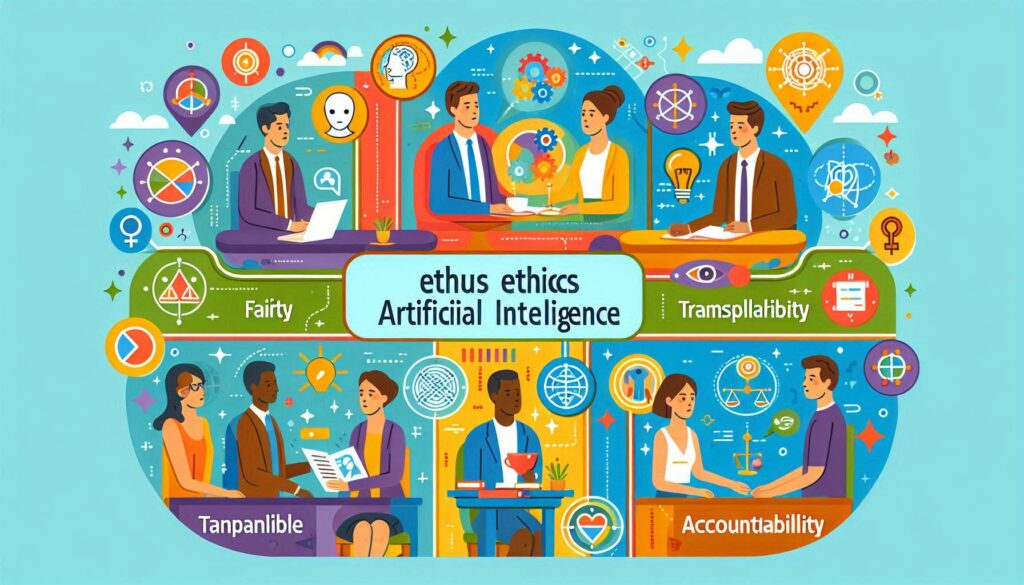Artificial Intelligence (AI) is no longer just a concept from science fiction; it is a driving force behind technological advancements in various industries. From healthcare and education to finance and entertainment, AI has transformed how we work, live, and interact with technology. However, as AI continues to integrate into our daily lives, ethical considerations surrounding its development and deployment have become increasingly critical. This article explores the ethics in AI and provides users with a comprehensive understanding of what they need to know about AI ethics.
Understanding AI Ethics
AI ethics refers to the principles and guidelines that govern the development, deployment, and use of AI technologies. These principles aim to ensure that AI systems are designed and used responsibly, minimizing harm and promoting fairness, transparency, and accountability.
Key aspects of AI ethics include:
- Fairness: Ensuring AI systems do not discriminate based on race, gender, religion, or other attributes.
- Transparency: Making AI systems understandable and explainable to users.
- Accountability: Assigning responsibility for AI outcomes to developers, organizations, or end-users.
- Privacy: Protecting user data and ensuring it is not misused.
- Safety: Guaranteeing that AI systems operate without causing harm to individuals or society.
Why AI Ethics Matter
The rapid growth of AI technologies has brought numerous benefits, but it has also raised significant ethical concerns. Here are some key reasons why AI ethics matter:

1. Mitigating Bias
AI systems learn from data, and if the data used for training contains biases, the AI can replicate and amplify these biases. For example, biased hiring algorithms can favor certain demographics, perpetuating existing inequalities. Ethical AI development involves identifying and mitigating biases to create fairer systems.
2. Ensuring Privacy
AI-powered tools often require access to vast amounts of personal data. Without robust ethical guidelines, there is a risk of data breaches, unauthorized surveillance, and misuse of sensitive information. Ethical AI practices prioritize user privacy and comply with data protection laws like GDPR.
3. Avoiding Harm
AI systems can inadvertently cause harm if not designed or tested properly. For example, autonomous vehicles might fail to recognize pedestrians in certain conditions, leading to accidents. Ethical AI focuses on rigorous testing and safety measures to prevent such scenarios.
4. Fostering Trust
Transparency and accountability in AI development foster trust among users. When people understand how AI systems work and who is responsible for their outcomes, they are more likely to embrace these technologies.
Ethical Challenges in AI
While the principles of AI ethics are clear, implementing them is often challenging. Here are some common ethical dilemmas in AI:
1. Algorithmic Bias
Algorithmic bias occurs when AI systems produce unfair outcomes due to biased training data or flawed algorithms. For instance, facial recognition systems have been found to perform poorly on darker-skinned individuals compared to lighter-skinned individuals. Addressing algorithmic bias requires diverse datasets and continuous monitoring.
2. Transparency vs. Complexity
AI systems, especially those based on deep learning, are often considered “black boxes” because their decision-making processes are not easily understandable. Balancing transparency with the inherent complexity of AI models is a significant ethical challenge.
3. Autonomous Decision-Making
AI systems capable of making decisions without human intervention raise ethical questions about accountability. For example, who is responsible if an autonomous vehicle causes an accident—the manufacturer, the software developer, or the user?
4. Weaponization of AI
AI technologies have the potential to be weaponized, leading to autonomous weapons systems or enhanced cyberattacks. Ethical considerations must address the misuse of AI in warfare and national security.
5. Job Displacement
Automation driven by AI has the potential to displace jobs, leading to economic and social challenges. While AI can create new opportunities, ethical AI development must account for its impact on employment and workforce dynamics.
Principles of Ethical AI
Several organizations and research institutions have proposed frameworks for ethical AI. While these frameworks may vary, they generally emphasize the following principles:
1. Inclusivity
AI systems should be inclusive, ensuring that diverse perspectives and needs are considered during development. This involves including underrepresented groups in data collection and decision-making processes.
2. Explainability
AI systems should be designed to provide explanations for their decisions. Explainability helps users understand how and why decisions are made, promoting trust and accountability.
3. Responsibility
Organizations and developers must take responsibility for the outcomes of AI systems. This includes addressing unintended consequences and rectifying harmful outcomes.
4. Regulatory Compliance
AI systems must comply with legal and regulatory requirements, such as data protection laws and industry standards.
5. Sustainability
AI development should prioritize environmental sustainability, considering the energy consumption and carbon footprint of AI systems.
Real-World Examples of AI Ethics in Action
1. Healthcare
AI-powered diagnostic tools have the potential to improve healthcare outcomes, but ethical concerns include patient privacy and algorithmic bias. Ethical AI in healthcare involves ensuring accurate diagnoses for diverse populations and protecting patient data.
2. Criminal Justice
AI systems are used for predictive policing and risk assessment in criminal justice. However, these systems have faced criticism for perpetuating racial and socioeconomic biases. Ethical AI in this domain focuses on transparency and fairness.
3. Social Media
AI algorithms drive content recommendations on social media platforms. Ethical concerns include the spread of misinformation, echo chambers, and mental health impacts. Addressing these issues requires balancing user engagement with societal well-being.
4. Autonomous Vehicles
Ethical dilemmas in autonomous vehicles include decision-making in life-or-death scenarios. For example, should an autonomous vehicle prioritize the safety of its passengers or pedestrians? Ethical AI development involves clear guidelines for such scenarios.
What Can Users Do?
While developers and organizations play a significant role in ethical AI, users also have a part to play. Here are some actions users can take:
1. Educate Yourself
Understand how AI systems work and the ethical issues they may pose. Knowledge empowers you to make informed decisions about using AI technologies.
2. Advocate for Transparency
Support organizations and products that prioritize transparency in their AI systems. Ask questions about how AI systems make decisions and how your data is used.
3. Report Bias and Harm
If you encounter biased or harmful AI outcomes, report them to the relevant organization or regulatory body. User feedback is crucial for improving AI systems.
4. Support Ethical AI Initiatives
Encourage and support initiatives that promote ethical AI development, such as open-source projects, academic research, and advocacy organizations.
5. Be Critical of AI
Do not accept AI outputs at face value. Critically evaluate AI decisions, especially in high-stakes scenarios like healthcare, finance, or law enforcement.
The Role of Policy and Regulation
Governments and regulatory bodies have a significant role in shaping the ethical use of AI. Policies and regulations can establish standards for transparency, accountability, and fairness. Examples include:
- The European Union’s AI Act: Aims to regulate AI technologies based on their potential risks.
- The General Data Protection Regulation (GDPR): Protects user data and privacy in AI systems.
- The Partnership on AI: A collaborative initiative promoting ethical AI development and use.
These regulations provide a foundation for addressing ethical concerns and ensuring responsible AI development.
The Future of AI Ethics
As AI technologies evolve, so will the ethical challenges they present. Emerging areas like generative AI, quantum computing, and brain-computer interfaces will raise new ethical questions. The future of AI ethics will require ongoing collaboration among developers, policymakers, researchers, and users.
Key Trends to Watch:
- AI Auditing: Independent audits to assess the fairness, transparency, and safety of AI systems.
- Ethical AI Certifications: Standards and certifications for organizations that adhere to ethical AI practices.
- Global Cooperation: International collaboration to address cross-border ethical challenges in AI.
Taking a Holistic Approach to AI Ethics
The ethics of AI cannot be confined to a single aspect of its development or use. Instead, it requires a holistic approach that considers its entire lifecycle—from ideation and design to deployment and long-term impact. Below are additional aspects where ethical AI practices can make a significant difference.
Ethical AI in Education
AI is revolutionizing education through personalized learning platforms, intelligent tutoring systems, and administrative automation. However, these advancements come with ethical responsibilities.
1. Equity in Access
AI-driven educational tools must ensure equitable access to all students, regardless of socioeconomic status. Ethical AI should minimize the “digital divide” by providing affordable and accessible solutions.
2. Data Privacy
Student data collected by AI systems must be protected. Ethical guidelines should prohibit the misuse of sensitive information, such as academic performance or behavioral patterns, for purposes beyond education.
3. Content Bias
AI systems used in education must be free of cultural or ideological biases. For example, content recommendations should promote diverse perspectives and inclusive learning.
AI in Environmental Sustainability
AI has significant potential to address environmental challenges, from optimizing renewable energy sources to monitoring deforestation. However, ethical considerations must guide its application to ensure sustainability.
1. Reducing Carbon Footprint
AI models, particularly those requiring extensive computational resources, can consume significant energy. Ethical AI development should prioritize energy-efficient algorithms and utilize renewable energy sources.
2. Environmental Justice
AI systems should be used to promote environmental justice by addressing the unequal distribution of environmental benefits and burdens across communities. For example, AI can help identify areas disproportionately affected by pollution and propose solutions.
3. Predictive Analytics for Conservation
AI can be used responsibly to predict and mitigate environmental risks, such as wildfires or floods. However, ethical considerations must address the potential unintended consequences of relying solely on AI predictions.
Cultural and Global Perspectives on AI Ethics
AI ethics is not a one-size-fits-all concept. Different cultures and societies may have varying perspectives on what constitutes ethical AI practices. A global approach to AI ethics must recognize and respect these differences while seeking common ground.
1. Cultural Sensitivity
AI systems should be designed to reflect and respect the cultural values of the regions in which they are deployed. For example, a chatbot used in healthcare should adapt to local languages, customs, and norms.
2. Global Collaboration
International organizations, such as the United Nations, can play a pivotal role in establishing global standards for ethical AI. Collaborative efforts can help address challenges like cross-border data sharing and the global impact of AI technologies.
3. Addressing Inequalities
Developing nations often lack the resources to implement advanced AI technologies. Ethical AI initiatives should focus on reducing these disparities by providing funding, training, and open-source tools.
Ethics in Generative AI
Generative AI, such as large language models and image-generation tools, introduces unique ethical dilemmas:
1. Misinformation
Generative AI can produce convincing fake news, deepfakes, and misleading content. Ethical AI practices must include mechanisms to identify and mitigate the spread of misinformation.
2. Intellectual Property
Generative AI models often learn from vast datasets that include copyrighted material. Ethical guidelines should address issues of intellectual property and ensure fair compensation for creators.
3. Content Moderation
AI-generated content may include harmful or inappropriate material. Developers must implement safeguards to filter such content while maintaining creative freedom.
4. Bias in Outputs
Generative AI models can inadvertently produce biased outputs. Continuous monitoring, testing, and dataset diversification are essential to reducing bias.
Ethical Implications of AI in Governance
Governments increasingly use AI for decision-making, from allocating public resources to enhancing national security. While AI can improve efficiency, it also raises ethical concerns.
1. Surveillance and Privacy
AI-powered surveillance systems can infringe on individual privacy and civil liberties. Ethical AI requires strict oversight and transparent policies to prevent misuse.
2. Algorithmic Governance
AI algorithms used in public decision-making must be transparent and accountable. Citizens should have the right to understand and challenge decisions made by AI systems.
3. Electoral Integrity
AI can influence elections through micro-targeted advertisements and misinformation campaigns. Ethical AI practices should ensure the integrity of democratic processes.
AI Ethics in the Workplace
AI is transforming workplaces through automation, predictive analytics, and enhanced decision-making. Ethical AI in the workplace focuses on balancing efficiency with employee rights.
1. Workforce Displacement
Organizations using AI for automation must address the potential displacement of workers. Ethical practices include reskilling programs and creating opportunities for displaced employees.
2. Surveillance
AI systems used for employee monitoring must respect privacy and avoid intrusive practices. Transparency in how these systems are used can foster trust among employees.
3. Bias in Hiring
AI-powered recruitment tools must be designed to eliminate bias. For example, algorithms should not disadvantage candidates based on gender, ethnicity, or age.
How Organizations Can Lead in AI Ethics
Organizations at the forefront of AI development have a responsibility to set ethical standards. Here’s how they can lead:
1. Establishing AI Ethics Committees
Dedicated committees can oversee the ethical implications of AI projects, ensuring alignment with organizational values and societal expectations.
2. Investing in Ethical Research
Funding research on AI ethics can help organizations stay ahead of emerging challenges. Collaborating with academic institutions and think tanks can also provide valuable insights.
3. Transparency Reports
Organizations should publish regular transparency reports detailing how their AI systems operate, what data they use, and how ethical concerns are addressed.
4. Inclusive Design Processes
Involving diverse stakeholders, including ethicists, sociologists, and community representatives, in the design process can lead to more ethical AI systems.
AI Ethics for Developers
Developers play a crucial role in ensuring ethical AI. Here are some best practices:
1. Diverse and Inclusive Datasets
Use datasets that represent diverse populations to reduce bias in AI models.
2. Explainable AI
Prioritize models that can provide clear explanations for their decisions.
3. Regular Audits
Conduct regular audits of AI systems to identify and address ethical issues.
4. Collaboration
Work with interdisciplinary teams to address the multifaceted nature of AI ethics.
Conclusion: A Shared Responsibility
The ethical implications of AI are far-reaching, impacting individuals, organizations, and societies. Addressing these challenges requires collaboration among developers, policymakers, users, and other stakeholders. By prioritizing fairness, transparency, accountability, and inclusivity, we can ensure that AI technologies contribute positively to humanity while minimizing harm.
As AI continues to evolve, so must our ethical frameworks. By staying informed and proactive, we can navigate the complexities of AI ethics and build a future where AI serves as a force for good.
Explore how AI tools calculate image objects with precision by leveraging advanced algorithms and deep learning techniques. Learn more in our detailed guide: How the Image Object Will Be Calculated in AI Tools.


